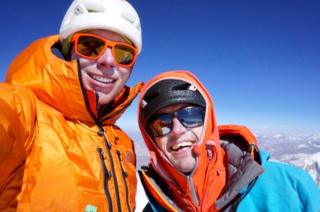Pakistan rescue: ‘I could smell the blood and feared for his life’
Tom Livingstone thought his friend might die as they waited to be rescued from the top of Koyo Zum. …

 Image copyright Ally Swinton/Tom Livingstone
Image copyright Ally Swinton/Tom Livingstone A man who saved a Scottish climber from perishing on a 22,500ft (6,858m) peak in Pakistan has described how he feared his friend would not return from the expedition alive.
What started as a much-anticipated trip for five highly-experienced climbers to Koyo Zum in the Khyber Pakhtunkhwa province ended in drama and a very long night for Tom Livingstone and Scot Ally Swinton.
A mistake with his footing led to Ally, from Leven in Fife, falling about 65ft (20m) and suffering a number of injuries.
Seven days earlier, the five friends had split up to tackle different sides of the mountain.
Koyo Zum is a long, narrow mountain with steep icy slopes. The experienced climbers in the British expedition broke into three groups to tackle it.
William Sim and John Crook took the left-hand skyline on the east and Tom and Ally took the unclimbed west face. Fellow Scot Uisdean Hawthorn had returned to base camp.
The pair were enjoying the challenge, reaching a height of 18,000ft (5486m). They described it as an “amazing, testing experience”.
Then Ally, 30, fell into a crevasse.
Tom, 28, said: “I did what anyone would do and cared for him as I’m sure he would for me.
“He was covered in blood from a head wound. I sliced open his trousers to check his leg pain, hoping my fingers wouldn’t meet a sharp bone and soft, wet flesh. Thankfully the leg was only badly bruised.”
Tom said he tried to reason through the adrenaline rushing through him.
He knew they were in a remote region of Pakistan, and the only photo he had seen of their planned descent looked like a “gnarly, long glacier”. It would take at least a day to make it down, if they were lucky.
Ally was bleeding badly from his head and shivering.
They had no gas left and only a few energy bars and nuts left to eat.
He said: “I knew Ally needed more medical attention than our single bandage could provide. After a few minutes of thought, I pressed the SOS button on our satellite communicator.”
Ally stayed conscious as they waited for the helicopter rescue, but in the first afternoon Tom noticed he seemed very faint, unresponsive and weak.
He admitted: “For a time, I was genuinely concerned he might die in the night.
“It was quite an experience to spoon Ally, covered in blood, throughout the night. I can still smell the blood.
“I listened to his breathing, already irregular from the altitude, and when his breath paused for seconds… and seconds… and I’d give him a nudge, my own breath held for his next inhale.”
Thankfully, his condition improved by the next day and relief came in the form of the sound of helicopter rotor blades.
Thanks to the Pakistani army, all five were then rescued.
Tom and Ally were taken off the mountain on 30 September and Ally received the medical treatment he needed in Gilgit-Baltistan.
The pair are now home and grateful for the rescue. But they want to remember the climb as one of the best they have ever done.
Tom said: “I hold myself to high standards and ethics. I want to push the limits of climbing high and free. I have echoed others’ comments in the past about these standards: ‘If you get frostbite on a route, you lose. If you get rescued on a route, you lose.’
“We got rescued. We ultimately lost by those terms. The main thing is that we’re both safe and well and we had an amazing adventure.”




